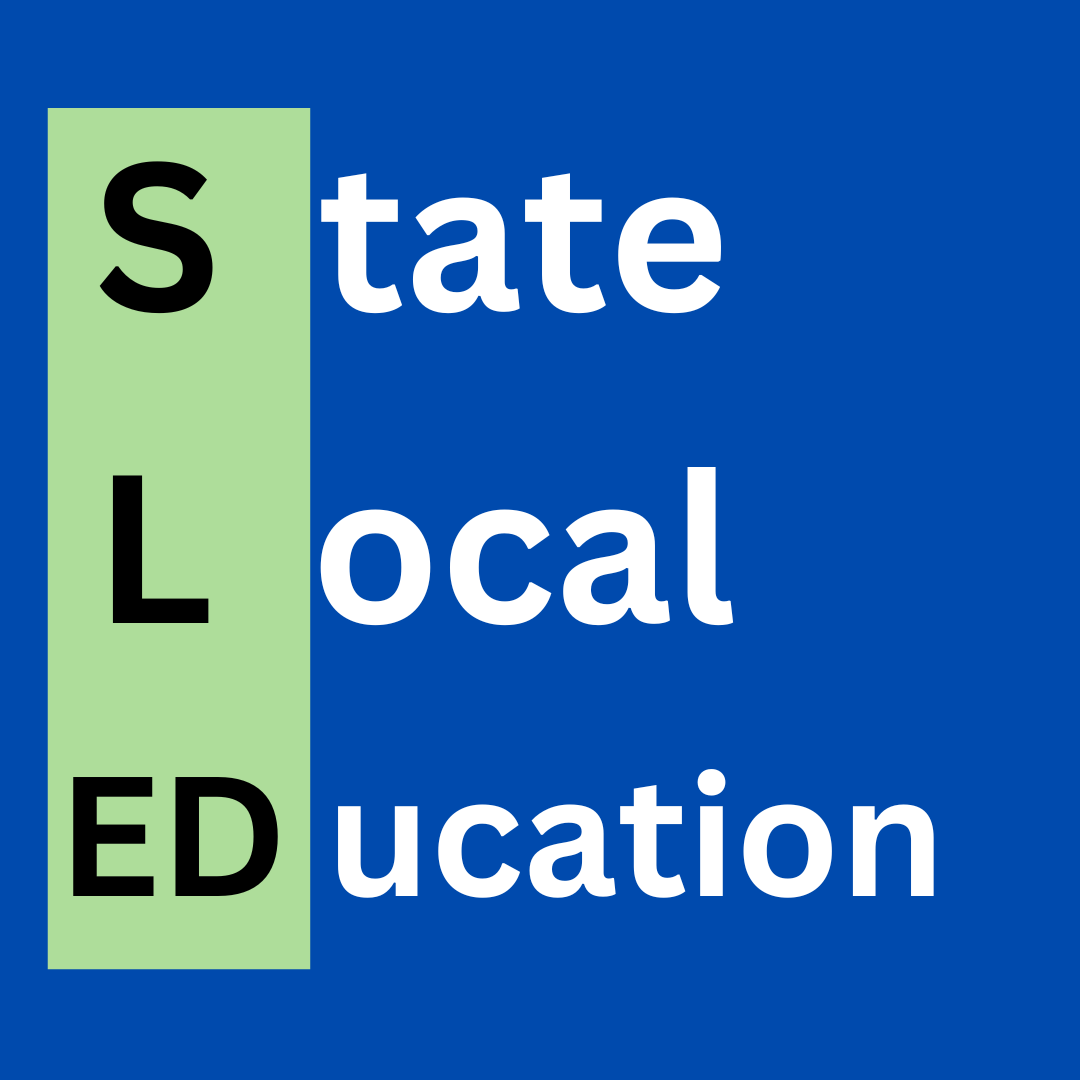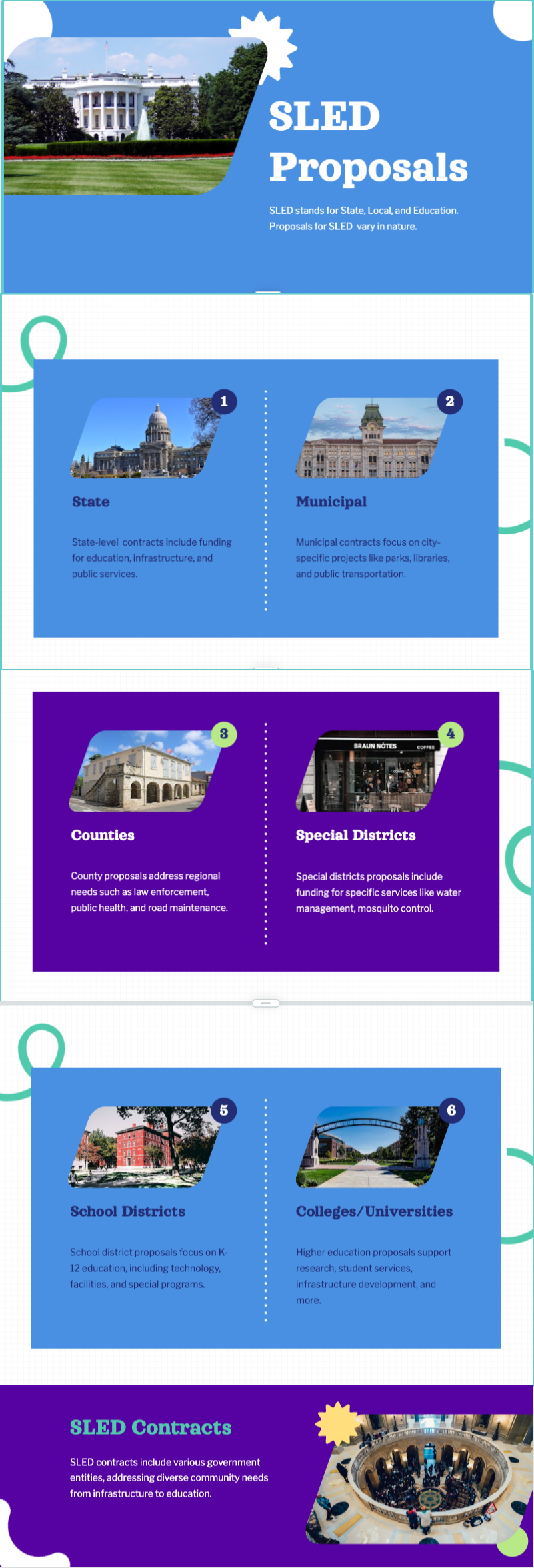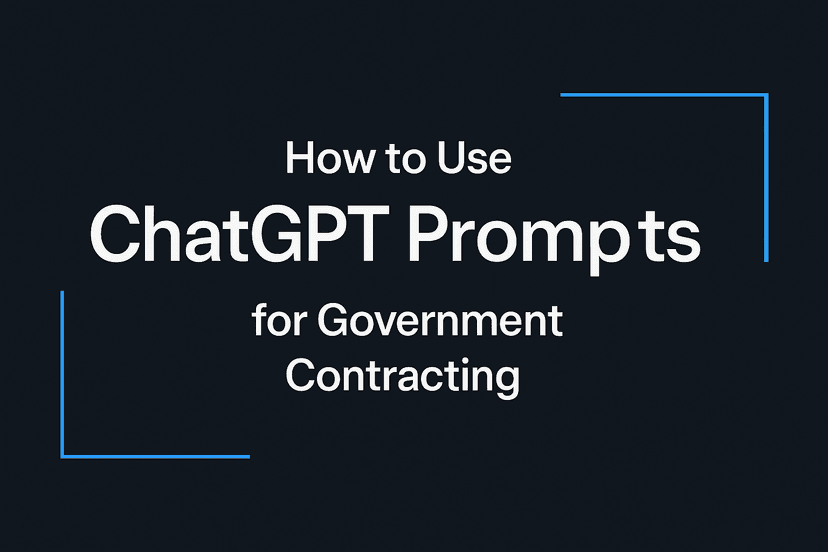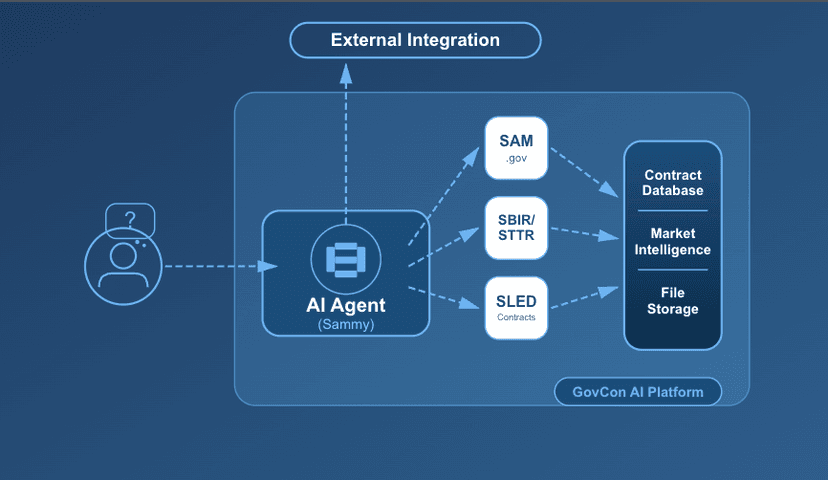How to Find and Win State, Local, and Education (SLED) Government Contracts

What does SLED stand for in government
SLED is an acronym representing the Business to Government market segment that includes State, Local, and Education projects.
- S for State
- L for Local
- ED for Education

These entities have distinct service needs to support their populations, offering many business opportunities. There are over 90,000 different government organizations within the SLED market, including:
- 50 States
- 3,000+ Counties / Boroughs / Parishes
- 36,000+ Cities / Towns / Municipalities
- 12,000+ Public School Systems
- 2,000+ Higher Education Institutions
- 38,000+ Special Districts
What is important to remember about all these organizations is that they are independent of each other. For example, the rules and regulations governing how the City of New York conducts procurements will be different than those of the City of Los Angeles.
Understanding SLED Contracting
The procurement spending within the SLED sector surpasses that of the federal market by nearly threefold. With over 100,000 state and local government purchasing entities actively assessing and acquiring a wide array of products and services, it's no surprise that SLED agencies generate over 500,000 Requests for Proposals (RFPs) each year. This presents immense revenue-generating prospects.
Unlike the federal government, SLED agencies operate on their own business schedules, often aligning their budgeting and purchasing activities with their respective state's fiscal year. This unique characteristic of the state, local, and education (SLED) procurement market represents a substantial opportunity for your company to expand its sales potential.

-
State Governments primarily oversee contracts pertaining to civilian infrastructure like roads, highways, and water systems, along with significant information technology projects. They also maintain crucial services such as law enforcement, fire departments, zoning regulations, professional licensing, and electoral processes.
-
Municipal governments are responsible for the day-to-day operations and upkeep of cities, towns, villages, and similar localities.
-
Counties covering larger geographical areas than municipalities, handle administrative tasks such as voter registration, record-keeping, law enforcement, and health and welfare services, often operating under state constitutional guidelines.
-
Special districts are distinct local entities dedicated to specific functions like electricity generation, firefighting, flood control, healthcare, housing, parks, libraries, and water/sewer services, among others.
-
Independent school districts focus solely on primary and secondary education, operating independently from municipal, county, or state oversight.
-
Public colleges and universities funded predominantly through state ownership and public funds, cater to higher education needs.
Why bid on SLED contracts?
- Market Size: SLED agencies are responsible for purchasing goods and services valued at nearly $1.5 trillion annually, representing almost 10% of the United States GDP.
The sheer size of the SLED market underscores its potential for generating substantial revenue and business opportunities. With such a significant portion of the national economy, tapping into this market can be lucrative for businesses seeking stable revenue streams.
- Contract Distribution: The majority of awards are for amounts less than $1,000,000. For every contract at $1 million or more, there are generally five contracts ranging from $100,000 to $260,000 across multiple industries. About 16% of awards exceed $1 million in value.
While individual contract values may vary, the distribution of contracts across various sizes indicates a diverse range of opportunities within the SLED market. Small businesses can strategically pursue contracts of varying sizes to maintain a steady flow of revenue while also aiming for higher-value contracts when feasible.
How can a company establish a sales team targeting SLED?
Begin by gaining industry experience, ideally within an Original Equipment Manufacturer (OEM) or Distributor, to grasp the transactional dynamics. Understanding the SLED space's nuances, key players, and where maximum ROI lies is crucial. Consider launching your company only after absorbing comprehensive knowledge, unless you have substantial funding to hire seasoned professionals with established networks and revenue streams.
Subsequently, prioritize learning governmental policies, funding mechanisms, and market specifics, such as initiatives like Florida's "Cloud First." This insight can help your team unlock new customer opportunities, especially amidst evolving procurement models like shifting from capital to operational expenditure.
Differentiate between a good and exceptional team by their grasp of SLED intricacies, including legislation, procurement cycles, and funding mechanisms, influencing customer decisions.
Recognize the SLED market's cyclicality and its responsiveness to economic and political shifts. During crises, governments often inject funds, albeit sometimes belatedly. Presidential elections introduce economic uncertainty, impacting federal funding allocations and subsequently, SLED markets.
While the SLED sector presents significant sales potential, success hinges on persistent effort, often surpassing commercial sectors. However, the upside includes more consistent revenue streams and long-term contracts, offering predictable yearly income.
How to Win SLED Government Contracts
1. Research the Contracting Agency
Before you jump into bidding for SLED government contracts, it's important to understand how their contracting process works. Each state, local, and educational government agency has its own set of rules for buying goods and services.
If you're on a tight budget, start by checking out the procurement websites of SLED government agencies in your area. These websites list current and upcoming contracts, and explain how to bid for them.
SLED contracts come in different types, including:
- Supply contracts, for buying goods or services.
- Service contracts, for things like consulting or maintenance.
- Construction contracts, for building new facilities or fixing up existing ones.
2. Register With the SLED Government Agency
Not every business can bid on SLED government contracts; there are eligibility criteria to meet. Typically, SLED government agencies require businesses to register before they can participate in bidding. During registration, you'll need to provide details about your business, including its structure, tax ID, and contact information.
Moreover, some government agencies offer programs that certify businesses as vendors. To achieve certification, businesses must meet specific criteria, such as demonstrating a solid financial track record or satisfying requirements for minority and women-owned businesses. Being a certified vendor can boost your competitiveness when vying for SLED government contracts.
3. Develop a Relationship
Building relationships in government contracting is key for success. It entails more than just transactions; it involves building trust, understanding, and mutual respect between government agencies and contractors. Effective communication, transparency, and integrity serve as the cornerstones of these relationships. Contractors need to demonstrate their capabilities, reliability, and commitment to delivering quality services or products. Additionally, establishing rapport with key decision-makers, understanding the intricacies of government regulations, and navigating bureaucratic processes are essential. By developing strong relationships built on trust and collaboration, both parties can work together more effectively to achieve their objectives and ultimately serve the public interest.
4. Review RFP Requirements and Evaluation Criteria
Carefully review solicitations. Make sure you understand the requirements, evaluation criteria, and deadlines. Your proposal must meet every requirement and align with the government agency’s goals and objectives.
SLED government contracts are typically awarded to the bidder who best meets the evaluation criteria such as Price, technical capabilities, and past performance.By understanding the bid requirements, evaluation criteria and your competition, you can decide whether to bid or abstain.
Where can I find SLED conracts
The SLED market (State, Local, and Education) offers a vast array of opportunities but comes with unique challenges for small business owners. Each state, city, and educational institution often has its own distinct procurement processes, making it difficult to navigate without the right tools.
That’s where Samsearch comes in. Samsearch simplifies the search for local and state contracts by providing a centralized platform to discover and manage SLED opportunities. Our cutting-edge AI search and filtering tools allow you to pinpoint contracts that align with your expertise, saving you time and effort.
In addition to using Samsearch, networking at government agency events and joining industry associations are great ways to stay informed about upcoming contracts and industry trends. Understanding each state's procurement rules is also essential. State procurement websites can supplement your strategy by offering important insights and requirements for successful bidding.
With Samsearch, you gain a competitive edge in navigating the complexities of the SLED market, turning challenges into growth opportunities.
The following is a list of procurement websites for evey state, where you can find SLED government contracts that you can bid on:
- Alabama - https://purchasing.alabama.gov/
- Alaska - https://oppm.doa.alaska.gov/
- Arizona - https://spo.az.gov/
- Arkansas - https://transform.ar.gov/procurement/
- California - https://www.dgs.ca.gov/PD
- Colorado - https://osc.colorado.gov/spco
- Connecticut - https://portal.ct.gov/das/ctsource/ctsource?language=en_US
- Delaware - https://mymarketplace.delaware.gov/
- Florida - https://www.dms.myflorida.com/business_operations/state_purchasing
- Georgia - https://ssl.doas.state.ga.us/gpr/
- Hawaii - https://spo.hawaii.gov/
- Idaho - https://purchasing.idaho.gov/
- Illinois - https://www.bidbuy.illinois.gov/bso/
- Indiana - https://www.in.gov/idoa/procurement/
- Iowa - https://das.iowa.gov/vendor-resources
- Kansas - https://admin.ks.gov/offices/procurement-contracts
- Kentucky - https://finance.ky.gov/eProcurement/Pages/default.aspx
- Louisiana - https://www.doa.la.gov/doa/osp/
- Maine - https://www.maine.gov/dafs/bbm/procurementservices/home
- Maryland - https://procurement.maryland.gov/
- Massachusetts - https://www.mass.gov/sell-to-the-state
- Michigan - https://www.michigan.gov/dtmb/procurement
- Minnesota - https://mn.gov/admin/osp/
- Mississippi - https://www.procurement.msstate.edu/
- Missouri - https://purch.oa.mo.gov/
- Montana - https://spb.mt.gov/
- Nebraska - https://das.nebraska.gov/materiel/sites/purchasing.html
- Nevada - https://purchasing.nv.gov/
- New Hampshire - https://www.das.nh.gov/purchasing/index.aspx
- New Jersey - https://www.nj.gov/treasury/purchase/
- New Mexico - https://www.generalservices.state.nm.us/state-purchasing/
- New York - https://ogs.ny.gov/procurement
- North Carolina - https://eprocurement.nc.gov/
- North Dakota - https://www.omb.nd.gov/doing-business-state/procurement
- Ohio - https://ohiobuys.ohio.gov/
- Oklahoma - https://oklahoma.gov/omes/divisions/central-purchasing.html
- Oregon - https://www.oregon.gov/DAS/Procurement/Pages/index.aspx
- Pennsylvania - https://www.dgs.pa.gov/Materials-Services-Procurement/Pages/default.aspx
- Rhode Island - https://ridop.ri.gov/
- South Carolina - https://procurement.sc.gov/
- South Dakota - https://boa.sd.gov/central-services/procurement-management/default.aspx
- Tennessee - https://www.tn.gov/generalservices/procurement.html
- Texas - https://comptroller.texas.gov/purchasing/
- Utah - https://bids.sciquest.com/apps/Router/PublicEvent?CustomerOrg=StateOfUtah
- Vermont - http://bgs.vermont.gov/purchasing
- Virginia - https://eva.virginia.gov/
- Washington - https://des.wa.gov/sell/bid-opportunities
- West Virginia - https://www.state.wv.us/admin/purchase/
- Wisconsin - https://doa.wi.gov/Pages/StateEmployees/Procurement.aspx
- Wyoming - https://ai.wyo.gov/divisions/general-services/purchasing
About Samsearch
Samsearch is an all-in-one platform that streamlines the entire government contracting process. Our solution brings together discovery, management, compliance, and proposal drafting — eliminating the need for multiple disjointed government contracting softwares.














